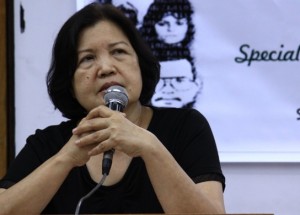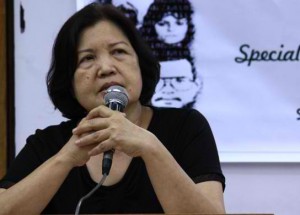By GIAN GERONIMO
Photo and video by MARC CAYABYAB

IN barely two months, President Benigno S. Aquino III’s first year in office is coming to a close. But human rights watchdogs here and overseas are still waiting for him to do at least two things to address the persistent problem of enforced disappearances.
Despite repeated requests, Aquino has yet to sign the International Convention for the Protection of All Persons from Enforced Disappearances and certify a domestic bill that would make involuntary disappearances a crime as a priority measure.
At a recent forum, visiting international human rights law expert Gabriella Citroni said the international community, including international bodies like the United Nations Committee Against Torture, has “suggested many times” to the Philippines to sign and ratify the treaty.
“It would be very interesting to receive an answer to that call from the international committee,” said Citroni, a professor of the University of Milano-Bicocca in Italy.
Nilda Lagman-Sevilla, co-chair of the nongovernmental Families of Victims of Involuntary Disappearance (FIND), said human rights advocates met Aquino in October specifically to urge him to not only sign the convention but also make House Bill 98, which seeks to penalize enforced disappearances as a crime, a priority bill.
“We have been looking for a definitive human rights agenda (and) were hopeful when he said he would sign,” Lagman told the forum.
She expressed concern over what has now become Aquino’s “uncertain stance” on both documents.
Because the Aquino administration has neither signed and ratified the convention nor enacted a law declaring enforced disappearances a crime, these acts are still considered as kidnapping or illegal detention under Philippine laws.
The Philippines is one of the 79 United Nations member countries that have yet to sign the UN convention despite pledging its support for it in 2007.
The convention, which was adopted in 2006 and took effect in December, declares enforced disappearances as a crime against humanity and seeks its prevention.
It defines enforced disappearance as “the arrest, detention, abduction or any other form of deprivation of liberty by agents of the State or by persons or groups of persons acting with the authorization, support or acquiescence of the State.”
The convention also requires signatory states to codify its provisions into domestic legislation.
As of April, 88 states have signed the convention while 25 have ratified it. Japan is the only Asian country that has signed and ratified the treaty, according to Citroni.
The difference between signing and ratifying is that the former does not legally bind a state to the treaty while the latter signifies that a state is legally bound by it.
The UN Working Group on Enforced or Involuntary Disappearances (UNWGEID), which transmits reported cases to governments around the world, requested the Philippine government to invite it to the country in May 2006 and reiterated its request in August 2010.
The UNWGEID is still awaiting a response from the Philippine government. Protocol dictates that it has to be invited by the government.
Citroni said, “Interestingly enough, they (UNWGEID) were not answered ‘no’ (by the government). They were not answered (at all).”
Sevilla, the sister of human rights lawyer Hermon Lagman who disappeared in May 1977, described bills penalizing enforced disappearances as “overstaying in Congress.”
The FIND co-chairperson is also the sister and chief of staff of House Minority Leader Edcel Lagman, the proponent of House Bill 98, and of labor leader Filemon “Popoy” Lagman, who was assassinated in 2001.
The first bill on enforced disappearance was filed in Congress in September 1992. Enforced disappearance was then called “unexplained disappearance.”
Sevilla said, however, the bill was not supported by human rights group because it punished unexplained disappearance with death penalty.
She also said some lawmakers are satisfied with existing laws on kidnapping and murder under the Revised Penal Code and see no need for a separate law on enforced disappearances.
But Citroni stressed that the UN has declared that categorizing involuntary disappearances as kidnapping is not enough.
Enforced disappearances, in fact, should not happen at all. “(People) are born, live and die. They do not disappear,” she said.
There are 1,785 cases of enforced disappearances in the Philippines, according to human rights watchdog Asian Federation Against Involuntary Disappearances (AFAD).
Asia has the highest number of disappearances reported to the UN Working Group. Around 50,000 cases of enforced disappearances have been reported to it.
Jose Luis Martin C. Gascon, chairperson of the government’s monitoring committee for the international humanitarian law, said he would relay the data from the forum to the government.
“I would recommend very strongly that (the Philippines) sign and ratify the convention with haste,” he said. “We will really push very hard to make human rights front and center of this government’s policy.”
(The author and producer are University of the Philippines student interns of Vera Files.)
